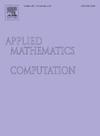Observer-based reachable set synthesis for multi-agent systems: A sampling-based distributed event-triggered strategy
IF 3.4
2区 数学
Q1 MATHEMATICS, APPLIED
引用次数: 0
Abstract
This paper investigates the problem of reachable set synthesis for a class of multi-agent systems. Considering the limited resources for communication between agents, a dual-end sampling mechanism is introduced to reduce the communication load. For the sampled signals at the output end, the cubic spline interpolation method is used to construct a fitting function to approximate the dynamic output signals, and a state observer is constructed according to the fitting function to estimate the system state of each agent. At the input side, the sampling distributed event triggering mechanism is used to design an event-based distributed observation control strategy to ensure that the tracking error is bounded. Finally, the results of the simulations substantiate the validity of the conclusions.
多智能体系统中基于观测器的可达集综合:一种基于抽样的分布式事件触发策略
研究了一类多智能体系统的可达集综合问题。考虑到代理间通信资源有限,引入了双端采样机制来降低通信负荷。对于输出端的采样信号,采用三次样条插值方法构造拟合函数来近似动态输出信号,并根据拟合函数构造状态观测器来估计各agent的系统状态。在输入端,采用采样分布式事件触发机制,设计基于事件的分布式观测控制策略,保证跟踪误差有界。最后,仿真结果验证了所得结论的有效性。
本文章由计算机程序翻译,如有差异,请以英文原文为准。
求助全文
约1分钟内获得全文
求助全文
来源期刊
CiteScore
7.90
自引率
10.00%
发文量
755
审稿时长
36 days
期刊介绍:
Applied Mathematics and Computation addresses work at the interface between applied mathematics, numerical computation, and applications of systems – oriented ideas to the physical, biological, social, and behavioral sciences, and emphasizes papers of a computational nature focusing on new algorithms, their analysis and numerical results.
In addition to presenting research papers, Applied Mathematics and Computation publishes review articles and single–topics issues.

 求助内容:
求助内容: 应助结果提醒方式:
应助结果提醒方式:


